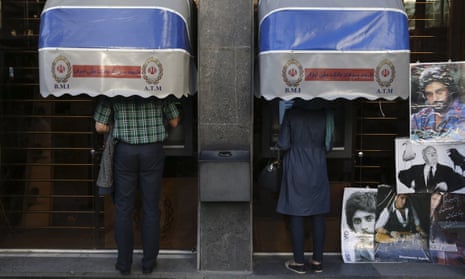Revelations that senior Iranian government employees were being paid astronomical salaries have rocked the country and threatened popular support for the president, Hassan Rouhani, amid Iran’s continued economic stagnation, little improved by the lifting of international sanctions in January.
The revelations, which have sparked widespread anger, have continued to dominate front pages across the country, and even led to the resignation of the head of the state insurance regulator, Mohammad Ebrahim Amin.
The scandal first erupted two months ago when a series of payslips surfaced online, which showed a number of top executives at the state insurance company were being paid monthly wages roughly 50 times higher than the lowest government salary.
This week, Rouhani instructed his vice-president, Eshaq Jahangiri, to launch an inquiry into the inflated salaries, and other exorbitant payments made to government officials. Rouhani’s opponents have sought to capitalise on the scandal to attack the president, who is already under pressure to demonstrate the economic benefits of last year’s nuclear deal.
In a letter to his vice-president, Rouhani sought to deflect blame to previous administrations for the high salaries.
“Reports show that some unconventional payments, bonuses or loans have been paid,” he wrote, according to the Isna news agency. “Those payments may have been compatible with the regulations left from previous administrations but nevertheless are unacceptable based on the ethical and fair values of this government.”
Before stepping down from his position, Amin had attempted to explain away the salaries, claiming that the leaked payslips showed disproportionately high salaries because they included employees’ back pay, owed from previous years. But his comments did little to quell nationwide outrage, amid new and continuing revelations about inflated salaries in other government departments.
It is not known who leaked the insurance company’s payslips, which in one case showed a payout of more than 870m rials (£17,400) in a single month. The lowest monthly government salary is estimated to be about 9m rials (£180). Under Iranian law, the highest salary for a government employee cannot be more than 10 times that of its lowest.
The scandal comes at a delicate time for Rouhani, who has come under increasing pressure to boost the country’s economy, an expected outcome of securing the nuclear agreement and the subsequent lifting of sanctions. Despite the foreign currency exchange market gaining some stability, the Iranian economy has remained stagnant, with workers throughout the country protesting for higher wages and pensions in recent months.
According to David Lipton, a senior official with the IMF who recently visited Tehran, Rouhani has successfully brought down the inflation rate from 45% in 2013, the year he was elected, to its current rate of 8%. Lipton praised Rouhani’s efforts to restore macroeonomic stability under difficult circumstances.
But the country’s economic woes persist. Having weathered a revolution and an eight-year war, Arj, Iran’s oldest manufacturer of electrical appliances, is the latest household name to face bankruptcy.

Comments (…)
Sign in or create your Guardian account to join the discussion